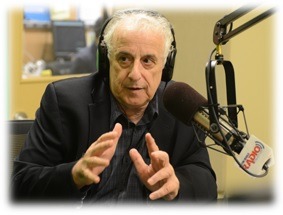Last week’s post – “What’s In A Name?” – about Clear Channel’s rebranding to iHeart Media touched a few emotional nerves in various ways.
There were a number of comments – both on this blog and in my email, along with a few personal contacts – about the trend to brand former radio products and companies as “media.” The concern – voice by several –is that the loss of the “R-word” ultimately degrades the broadcast radio business, along with the people who ply their skills behind a microphone.
First, the name Clear Channel only referred to radio obtusely, not directly. Greater Media, Entercom, Cumulus, Alpha, and Digity have nothing to do with radio specifically, even though they are all essentially radio companies.
Second, the move to “media” (and away from radio) is ultimately more descriptive of what broadcasters have simply got to do – and that’s become multi-media content creators and distributors to provide audiences and advertisers with an array of options and choices.
 Also last week, the editor and publisher of both RadioInfo and TALKERS, Michael Harrison, editorialized about this trend. Mike is a passionate radio guy, and an asset to this business.
Also last week, the editor and publisher of both RadioInfo and TALKERS, Michael Harrison, editorialized about this trend. Mike is a passionate radio guy, and an asset to this business.
When I first got into radio, he was Radio & Records AOR editor (Album Oriented Rock for those of you too young to remember). Mike has always been an eloquent voice for music radio, even though he wisely took the lead as talk and personality radio began its amazing rise.
Back in the day, Mike even booked Marshall McLuhan for an R&R convention to speak to the bigger picture of media theory. So when I read Mike’s piece last week, it got me thinking about the role of personalities in this rapidly changing tech ecosphere.
Here’s Mike’s article, followed by my observations:
“The systematic abandonment of ‘Radio’ by ‘Radio’ is a disturbing half-baked trend, that although understandable in the big picture of communications, poses an unnecessarily sped-up threat to the livelihoods of everyone in the radio business – not to mention the fundamental role of audio-media in both the spoken-word and musical arts.
The move away from the word ‘radio’ in the lexicon of our industry is certainly understandable from a sales and marketing standpoint, and it makes total sense to create unified multi-media platforms for today’s mega-consolidated, corporate behemoths to compete effectively in the ‘noisy’ world of the emerging digital era. However, those who work in the media arts that are fundamentally built upon aural foundations – spoken-word shows and music creation – will face increasingly limited opportunities to present their wares to an interested consumer base as venues and business opportunities evaporate at an exponential rate.
As we move more and more into a world of screens and not speakers, the only talent that will have a chance to survive in a bottom-line driven, corporate environment will be those whose assets are visually gifted. That does not bode well for the brilliant wordsmiths and musical geniuses who most likely do not have faces for television. It also does not hold much of a future for the deeper aspect of communication that is aurally based – a means of expression that runs deep within our very humanity, holding a unique and special place within our brains.
Those of us who are still proud of and value the role of ‘radio,’ audio-oriented music, and the theater of the mind, must give considerable consideration as to what the role, if any, audio-only media will have in this new age. It can and must be respected and preserved within this inevitable, emerging grid or we face the likely prospect of devolving overnight from making great radio and music to extremely cheesy television.”
All good points, and as always, Mike’s positions are always worthy and thoughtful. But I started thinking about this notion that the proliferation of screens will narrow the field for talkers, DJs, and hosts who are great with words, but not so wonderful visually. As he notes, screens of all sizes are becoming dominant parts of how people consume media.
Thankfully, radio has been able to participate on most of those screens, whether on smartphones or tablets. Over time as autonomous driving becomes more common, those who ride in these cars will gravitate to entertainment that is visual in origin – at least at a higher percentage than they are able to consume now while dangerously texting and driving.
So is this the beginning of the end for radio, or is it simply the beginning of the beginning?
Because as we have explored in this blog during the past few years, disruption forces old stars to adapt while bringing new ones to the center stage. Notably, two of the “Best Motion Picture” Oscars in just the past few years have focused on this topic.
The King’s Speech starring Colin Firth was a story about changing technology, as the King of England was forced to learn how to communicate on the radio. Of course, he struggled, but in the end he was able to adapt.
And in The Artist, the film’s silent film star refused to adapt to “talkies” and is eventually displaced by a new brand of movie icons. Change is uncomfortable and it can be bitter, as depicted in this amazing film. The ending eventually become a happy one, but the road was arduous and difficult because of the tech disruption caused by the advent of movie sound.
Change is hard, especially for those who have enjoyed the status quo. It tests everyone in all stratas of the organization and the industry. Accepting, adapting, and adjusting is hard work. It can be quite uncomfortable in workplaces that were once always fun and even kind of easy. But these are the necessary skills that radio people need to exude in order to make the transition.
We see signs of this every day in broadcast radio. Those who have the ability to connect with audiences – in person and in social spaces – have a unique edge. The old paradigm of the DJ hermit, locked down the hall in the air studio, is breaking apart. Today’s air talent need to be able to mix it up with listeners, clients, and community leaders.
Not every film star is handsome. The public appreciates an interesting face, whether it’s Peter Dinklage on Game of Thrones or Linda Hunt on NCIS. They may be exceptions, but they stand out because they’re different, captivating, and worthy of our attention. They’re also immensely talented actors.
And the same will be the case on the radios of the future. While good-looking DJs like Ryan Seacrest or Bobby Bones may have inherent advantages, Howard Stern proves that must-hear content trumps a pretty face. And he’s not alone. Words matter, and they will continue to in a media ecosphere that is now dominated by visuals. Screens or not, it’s the thought that counts.
These are changes that radio need to roll with. Let’s open up new visual doors, new avenues, and new paths for our content. And let’s embrace them because it’s truly a media world.
Thanks to Mike Harrison for that provocative think piece, and hopefully both of us will hear from you on this critically important topic for radio.
- What To Do If Your Radio Station Goes Through A Midlife Crisis - April 25, 2025
- A 2020 Lesson?It Could All Be Gone In A Flash - April 24, 2025
- How AI Can Give Radio Personalities More…PERSONALITY - April 23, 2025





Professor Harrison is an experienced example of why Boomers are necessary to propel media via radio.
Thanks you Mike & Fred! Clark
Thanks, Clark!
The first thing I noticed in Fred’s comments is that Michael Harrison has gotten older. LOL. Radio was my passion for many years but, in the words of the great Bob Dylan “the Times They Are A Changn’. I entered the radio business with emergence of the FM band and had a great run with it. We will see where things go from here!
Al, great to hear from you and thank so much for not pointing out that I have not gotten older
Morning, Fred. It’s just 4am and I am sipping my first cup o’joe, blurry eyed and bedheaded and soon to leave for the studio where anyone listening will imagine I look a whole lot more together than I actually will. But truth is, our listeners know us well enough that I’m pretty sure whatever level of disheveled I began at would be easily accepted. I would never be layering on make up to present something other than who I am. A little lip gloss perhaps, but look at Don Imus with the camera on in his studio. Does it matter that he looks, well, like he looks? Nope.
For newbies, the concept of being on camera might be scary and a good reason to pick another career direction, but once you’re comfortable on a microphone, having a camera pointing at you is just another piece of equipment. If you like to listen to someone, you’d quickly get just as used to seeing them as well. (And heaven help us if Ryan Seacrest is the standard! Nothing against the Media Mogul, but his look is as generic as his sound- or is that just me)
In a world… where cameras are everywhere… it’s still going to come down to talent and the ability to connect. Maybe a little eye contact won’t be such a bad thing.
PS- my personal theory is that the ClearChannel change had more to do with departing from a corporate image and creating a more media-friendly name. Plus, CC was not so much a well respected name at that.
Time for work. See you on Twitter.
Good morning, Cindy, it’s 5:30 and I’m reading your comments and thinking that you’re spot on. A pretty face is…well, a pretty face. It was never really about what Carson, Leno, Kimmel, or Fallon looked like – it was always whether they were funny, charming, and entertaining. That ability to connect – as you put it so well – is an attribute that will carry radio talent into the new world. Yes, it helps to look appealing, but never essential. It’s how you work it. Thanks for the wake-up call!